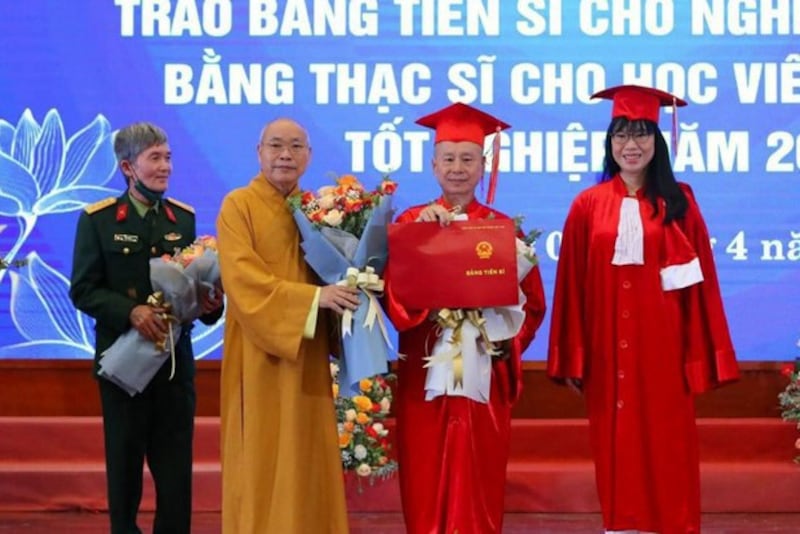A state-backed Buddhist monk who prompted an online uproar for dismissing a popular religious pilgrim as a “thug” has landed in hot water after it was discovered that he received a doctorate degree from a prestigious law school despite never having graduated from high school.
In March 2022, Thich Chan Quang, also known as Vuong Tan Viet, received a doctorate in Constitutional and Administrative Law from Hanoi Law University, or HLU, after successfully defending his dissertation the prior year.
However, Quang, the head of the Chan Quang Pagoda in Ba Ria-Vung Tau province, invited public scrutiny of his educational background in June after slamming unofficial Buddhist monk Thich Minh Tue as a “thug who wears ragged attire and holds a rice cooker” in a sermon.
Tue, whose real name is Le Anh Tu, drew a wide following on social media in May when influencers documented his pilgrimage across Vietnam on TikTok and other social media platforms.
While Tue is not a monk, supporters were drawn to his simple lifestyle and humble demeanor, which they felt set an example for the country’s Buddhist clergy.
RELATED STORIES
[ New video clip shows unofficial monk Thich Minh Tue walking with brotherOpens in new window ]
[ Vietnamese YouTubers fined for video of rock resembling monkOpens in new window ]
[ California congressman raises case of missing ‘monk’Opens in new window ]
[ No word from Thích Minh Tuệ in nearly 3 weeks, monk's relatives sayOpens in new window ]
In questioning Quang’s school record, social media users noted that the monk was admitted to HLU’s doctorate program despite never having received a master’s degree and that he earned his doctorate “at warp speed” in just over two years. They also suggested that his high school equivalency diploma appeared “fabricated,” although no evidence was provided to support the claim.
The criticism prompted the university to issue a statement on June 25 defending its decision to confer the degree, saying it was made in adherence to Ministry of Education and Training, or MOET, and university regulations.
Investigation underway
On Tuesday – nearly two months later – Vietnamese state media reported that the legitimacy of Quang’s doctorate degree was in doubt as the monk, who is also the head of the finance committee for a government-sanctioned Buddhist organization, had never earned a high school diploma.
The report cited Ho Chi Minh City Department of Education and Training, or DOET, Deputy Director Le Hoai Nam as saying that Quang was neither on a list of students taking part in the GED high school equivalent exams on June 6, 1989 – the year of his supposed graduation – nor a subsequent list announcing the results for all examinees.
Deputy Director Le told reporters that the discovery was the result of a recent review of Quang’s educational background jointly conducted by the Ho Chi Minh City DOET and an inspection delegation from the Vietnam Committee for Religious Affairs.

Meanwhile, in response to media inquiries, a HLU representative said the university was aware of the findings of the joint review and would take action in accordance with MOET guidelines dealing with doctorate candidates using fake diplomas for enrollment and creating fraudulent records for the purpose of obtaining degrees.
While Quang did not graduate from high school, he earned a bachelor’s degree in English from the University of Foreign Languages, now known as Hanoi University, in 2001 and a bachelor’s degree in law from HLU in 2019.
Associate Professor Hoang Dung told RFA Vietnamese that anyone found to have falsified their qualifications is subject to having their subsequent degrees revoked.
“This means that all of his bachelor's degrees and his doctorate are at risk,” he said. “The next step involves Hanoi University and Hanoi Law University issuing official decisions to revoke these degrees.”
Silent for months
Speaking to RFA Vietnamese, lawyer Le Quoc Quan, who earned undergraduate and master's degrees from HLU, said that the university now finds itself “in a difficult situation, as it has defended what was wrong.”
“The deeper they dig, the more issues they will find – from his GED diploma to his bachelor's degrees,” he said.
Lawyer Quan speculated that MOET and HLU had likely been aware of Quang’s lack of a high school education but chose not to share it with the media “as this issue could be much more complicated and involve several [government] agencies.”
A second lawyer who spoke to RFA on condition of anonymity also suggested that MOET may have remained silent about what he called “a series of irregularities and wrongdoings by HLU” with regards to Quang’s doctorate degree to avoid exposing its failure to monitor the university.
“HUL’s examination of candidates' qualifications might be problematic,” said the lawyer, who declined to be named due to security concerns. “If MOET pushes the issue too hard, it could damage the reputation of the education sector and [doctorate] training programs and lose face for a leading university that trains future leaders and those who uphold justice.”
The lawyer also suggested that MOET may have chosen to remain quiet about the case as it involves Vietnam’s Ministry of Justice, whose former Minister Le Thanh Long was promoted to deputy prime minister in late June.
In 2020, Hanoi-based Dong Do University – one of Vietnam’s oldest private institutions – was at the center of a scandal involving the issuance of bachelor’s degrees to 193 individuals who had not completed their studies. At least 55 of these individuals went on to use their fraudulent degrees to enroll in postgraduate programs, including PhD programs.
Translated by Anna Vu. Edited by Joshua Lipes and Malcolm Foster.
